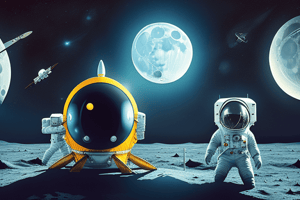Podcast
Questions and Answers
What is a satellite?
What is a satellite?
An object that revolves around another object in space.
What was the 'space race'?
What was the 'space race'?
A competition between the United States and the Soviet Union to achieve significant milestones in space exploration.
What event began the space race?
What event began the space race?
The launch of the satellite 'Sputnik I' by the Soviets in 1957.
What role did competition play in the space race, and who were the competitors?
What role did competition play in the space race, and who were the competitors?
What was the Apollo program?
What was the Apollo program?
Was the Apollo program successful in meeting President Kennedy's challenge?
Was the Apollo program successful in meeting President Kennedy's challenge?
Place these events in the correct sequence:
Place these events in the correct sequence:
Study Notes
Key Concepts in Astronomy
- Satellite: An object that orbits another object in space, such as moons or man-made satellites.
The Space Race
- Origins: Initiated in 1957 with the launch of "Sputnik I" by the Soviet Union, marking the start of competitive achievements in space exploration.
- U.S. Response: The United States accelerated its space program in reaction to the Soviet satellite launch, leading to a fierce competition.
- Major Competitors: The two primary nations involved in the space race were the United States and the Soviet Union, each striving for technological superiority.
Significant Achievements
- Apollo Program: A U.S. initiative aimed at landing astronauts on the moon, showcasing technological advancements and national pride.
- President Kennedy's Challenge: Launched in May 1961, the challenge aimed to accomplish a moon landing within a decade. Successfully achieved in July 1969.
Notable Events Timeline
- 1957: Launch of Sputnik I by the Soviets.
- 1958: Formation of NASA in response to the growing need for an organized space program.
- 1961:
- Yuri Gagarin becomes the first human to orbit Earth.
- Just a month later, the first American, Alan Shepard, also ventures into space.
- 1962: John Glenn orbits Earth, becoming a significant figure in U.S. space exploration.
- 1969: The culmination of the Apollo program with the first humans landing on the moon, fulfilling the goal set by President Kennedy.
Studying That Suits You
Use AI to generate personalized quizzes and flashcards to suit your learning preferences.
Description
Explore key concepts in astronomy, including the significance of satellites and the origins of the space race. This quiz covers major achievements such as the Apollo program and President Kennedy's moon landing challenge. Test your knowledge of the U.S. and Soviet Union's competition for space exploration dominance.





